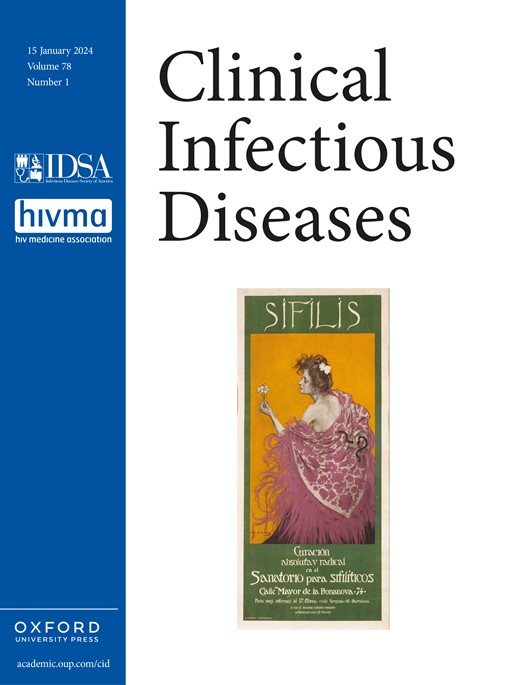进入未知:在SARS-CoV-2广泛血清阳性时代的实用瑞德西韦限制
IF 8.2
1区 医学
Q1 IMMUNOLOGY
引用次数: 0
摘要
背景有限的数据支持在广泛血清阳性的SARS-CoV-2时代常规使用瑞德西韦。方法在8家医院的卫生系统中,对具有免疫功能的成人患者实施瑞德西韦的限制。采用前后准实验设计对干预前12个月(2022年6月- 2023年5月)和干预后12个月(2023年7月- 2024年6月)的患者进行比较。主要终点为14天全因死亡率。结果共纳入4774例患者(干预前3323例;1451后干预)。干预后组接受瑞德西韦治疗的患者明显减少(干预前37.7%,干预后4.1%,p < 0.01)。当对中等风险协变量进行建模时,干预前后两组的14天全因死亡率没有差异(OR, 1.8;95% CI 0.54 ~ 5.8, p = 0.34)。同样,28天全因死亡率、30天再入院或LOS也没有差异。重症监护病房(ICU)入住情况和机械呼吸机(MV)使用情况在两组间存在差异。使用Remdesivir与干预前ICU入院和MV的风险较低相关,干预后与这些结果的相关性较高。当高风险值协变量建模时,观察到类似的结果。结论:在大型卫生系统中限制免疫能力患者使用瑞德西韦与死亡风险增加无关。仅在干预后组中,瑞德西韦的使用与ICU入院和MV风险的意外增加有关,这可能是由于接受瑞德西韦的高危患者人群所致。需要前瞻性研究来明确确定高度接种疫苗、免疫功能正常的患者是否受益于瑞德西韦。本文章由计算机程序翻译,如有差异,请以英文原文为准。
Into the Unknown: Practical Remdesivir Restriction in the Era of Widespread SARS-CoV-2 Seropositivity
Background There is limited data to support routine remdesivir use in the contemporary era of SARS-CoV-2 with widespread seropositivity. Methods A restriction of remdesivir among adult immunocompetent patients was implemented across an 8-hospital health system. A pre-post quasi-experimental design was used to compare patients 12 months pre-intervention (June 2022 - May 2023) to 12 months post-intervention (July 2023 – June 2024). The primary outcome was 14-day all-cause mortality. Results 4,774 patients were included in the analysis (3,323 pre-intervention; 1,451 post-intervention). Significantly fewer patients in the post-intervention group received remdesivir (37.7% pre-intervention vs 4.1% post-intervention, p<0.001). When medium-risk covariates were modeled, there was no difference in 14-day all-cause mortality between pre- and post-intervention groups (OR, 1.8; 95% CI 0.54 to 5.8, p = 0.34). Similarly, there was no difference in 28-day all-cause mortality, 30-day readmission, or LOS. Intensive care unit (ICU) admission and mechanical ventilator (MV) use were different between groups. Remdesivir use was associated with a lower risk of ICU admission and MV pre-intervention and higher association with these outcomes post-intervention. Similar outcomes were observed when high-risk value covariates were modeled. Conclusion Restriction of remdesivir use in immunocompetent patients across a large health system was not associated with an increased risk of mortality. Remdesivir use was associated with an unexpected increased risk of ICU admission and MV within the post-intervention group only, which is likely explained by the higher-risk patient population that received remdesivir. Prospective studies would be needed to definitively determine if highly vaccinated, immunocompetent patients benefit from remdesivir.
求助全文
通过发布文献求助,成功后即可免费获取论文全文。
去求助
来源期刊

Clinical Infectious Diseases
医学-传染病学
CiteScore
25.00
自引率
2.50%
发文量
900
审稿时长
3 months
期刊介绍:
Clinical Infectious Diseases (CID) is dedicated to publishing original research, reviews, guidelines, and perspectives with the potential to reshape clinical practice, providing clinicians with valuable insights for patient care. CID comprehensively addresses the clinical presentation, diagnosis, treatment, and prevention of a wide spectrum of infectious diseases. The journal places a high priority on the assessment of current and innovative treatments, microbiology, immunology, and policies, ensuring relevance to patient care in its commitment to advancing the field of infectious diseases.
 求助内容:
求助内容: 应助结果提醒方式:
应助结果提醒方式:


